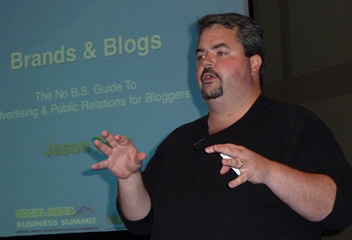 While initially sitting in a SEO session, I quickly switched once I saw that Jason Falls was presenting. Jason is one of those speakers that gives great advice and he’s funny.
While initially sitting in a SEO session, I quickly switched once I saw that Jason Falls was presenting. Jason is one of those speakers that gives great advice and he’s funny.
The lowdown on this session: How bloggers can better understand the world of advertising, marketing and PR to avoid common mistakes. How can we learn from the crappy behavior of the bloggers before us.
There’s a low cost of entry to become a blogger. Basically, all you need is a pulse and an internet connection. But, just because you’re a blogger, doesn’t mean you’re a diva. When you start to evolve as a blogger is when you attract an audience. You’re still not a rockstar, but you’ll be making progress when people are paying attention to you and engaging. For perspective, many advertisers require a minimum of 100k pageviews per month. If your blog isn’t at that level, you’re still building.
Blogger eg0 = trouble. Getting some attention and audience is an accomplishment but it’s not a reason to be a dick. Jason statistic: 15-20% of people in a given vertical think they’re god’s gift to blogging.
The conflict comes for the vast majority of bloggers who are not marketing bloggers or have marketing expertise. They don’t understand how the world of marketing and advertising works.
Soliciting money is advertising sales. (Paid Media) Any time you solicit money from an organization for space or exposure on your blog, that’s advertising. FTC requires disclosure of any kind of advertorial or ads. When you take money for publishing editorial content, you will degrade some trust with your audience – but not lose it.
The discussion you have with securing advertising on your blog might be with a media buyer, or with a larger organization, a media agency. This includes ads for media as well as advertorial.
Public relations is earned media. PR agencies or staff within companies may pitch stories to bloggers. There are PR software companies like Cision and My Media Info that will aggregate contact information for influential bloggers within particular verticals. PR can be an information resource and go between with a brand that you want to write about. PR doesn’t buy advertising (or they shouldn’t).
Blogger Horror Story 1: After being pitched, a blogger responded demanding that instead of the blogger writing about the brand, that the brand should advertise on his blog. While the blog was topically relevant, it didn’t have anywhere near the audience that the brand’s media buyers would consider.
Blogger Horror Story 2: Jason pitched a blogger about a brand he represented and the blogger responded saying that to have a conversation, she’d charge a consulting fee. Basically, this blogger responded to PR pitches with a consulting pitch.
The situation where bloggers have built up a certain size of audience and consider themselves a diva is where blogging douchebags came from.
Blogger Horror Story 3: Fortune 25 company, big brand, wide array of products. Identified 15 bloggers and pitched them to go to an industry conference – all expenses paid (airfare, hotel and conference). While at the event, the brand wanted to show the bloggers their products.
A week before the event, one of the bloggers left a message saying they’ve decided to turn the trip into a family vacation and requested more airline tickets. Then the blogger threatened that if the brand didn’t do this, there would be editorial repercussions on her blog.
Jason says there’s a high concentration of this type of blogger in the gaming and the mommy blogger groups.
The problem with this minority of bloggers is that brands end up not wanting to deal with bloggers at all.
As you build an audience and gain reputation, it’s important that there’s a difference between being a proud person and being a jackass. There’s an attitude of entitilement plus ignorance about how advertising and public relations works.
Trust: Your audience trust you less if you’re paid for creating brand content. There’s a perceived bias.
Respect: Mutual between bloggers and the brands that communicate with them. Loss of respect means loss of relationship and the benefits that come with that.
Reality: Jason shows a series of graphs that represent mainstream media reach compared to blogs – blogs barely show up, let alone compete. (There were no sources cited in these graphs and that was very disappointing, especially from a professional like Jason)
Bloggers have a place in the advertising and media world online, but in the majority of cases, do not come close to having the same reach or clout as mainstream media. Many bloggers that gain a certain size of audience and degree of influence start to overestimate their authority and impact, plus many don’t understand how relations between advertising and advertisers, media/publishers and public relations work.
What Bloggers and Brands need to consider:
- Ethics and impact of pay for play – disclosure
- Think of bloggers as journalists
- The effect of advertising and PR on your audience
- There’s no right way, only a right way for you
Opportunities for bloggers:
- Make PR be helpful. When you get an irrelevant pitch, offer PR feedback.
- If you want advertising, ask for the media buyer, not the PR person.
- When discussing advertising opportunity with a brand, make a compelling argument with facts from a third party on your audience and community.
- Partner with other blogs.
Opportunities for brands:
- Understand the power of niche
- Make all outreach relevant. This is a huge problem and persists across many verticals.
- Know & respect bloggers have differences. Some bloggers are not PR friendly, so don’t pitch them.
- Have a plan for when you get requests for advertising
Check out Jason’s community online: ExploringSocialMedia.com


